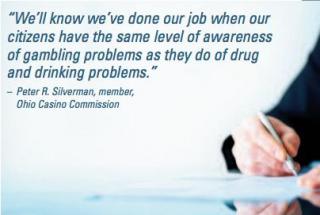The Toledo Pledge: Bringing Together Community Leaders And Organizers To Address Gambling Disorders

Last week, theNCRGandAGAreleased the winter 2013 edition ofResponsible Gaming Quarterly. While developing this edition of RGQ, we had the opportunity to learn more about a communitywide partnership effort in Toledo, Ohio, to increase awareness of gambling disorders.
From government and law enforcement to social services, community leaders came together in 2012 to take the steps necessary to increase community involvement and address the issue through education initiatives. This initiative is called The Toledo Pledge.
The Toledo Pledge states the following:
‘I will learn how to recognize the signs of a potential gambling problem, how to intervene with someone who has a problem, and what treatment options are available in our community. I will share this information with others and intervene when I recognize someone displaying the signs of problem gambling.’
Another version of the Toledo Pledge, which organizations can sign, has similar language. It also provides warning signs to help recognize problem gambling among employees or members, adding:
‘We will show compassion and patience to those with a gambling problem and commit to assisting them with steps toward a gambling-free life.’
To raise awareness about the Toledo Pledge and inform the community about gambling disorders, local stakeholders developed education initiatives that companies, service organizations, unions or places of worship could use to inform their employees or members. This, in turn, would encourage the employees and members to learn how to identify gambling disorders, know when to refer resources to individuals who might need help and to understand more about the treatment options available.
Organizers launched the program by publicizing it directly to the largest companies and organizations in the community. They also have created materials to distribute, including the brochure, “A Quick Guide to Safer Gambling: How Do You Play?” which offers guidance and encourages those concerned for themselves or someone they know to directly contact COMPASS, the Mental Health Board or the United Way. In addition to COMPASS, other organizations joining this effort include the Lucas County Commissioners and the Mental Health and Recovery Services Board of Lucas County.
The partner organizations are currently working toward the second phase of educating about The Toledo Pledge. They are developing methods to encourage these stakeholders to follow through on the pledge agreement, in order to send a broader message to a wider group of companies and organizations. This effort includes person-to-person encouragement, offering speakers for public events, providing materials and developing media and online campaigns to promote awareness.
Click hereto learn more about The Toledo Pledge and to read the full article inResponsible Gaming Quarterly.
What are some other communitywide initiatives to increase awareness of gambling disorders?
NCRG staffResponsible GamingAGAgambling disordersResponsible Gaming QuarterlyRGQThe Toledo Pledge

